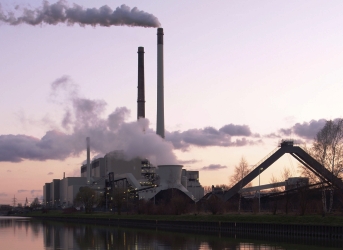The race is on in North America to shield the regional economy from the instability in the Middle East and North Africa casting a shadow over international oil supplies. Russian energy companies, for their part, are scrambling to realign themselves with energy-hungry Asian economies. Coal, meanwhile, remains king because it's cheaper and more abundant when compared with its counterparts, the International Energy Agency said. Two reports out this week, however, said that's part of the problem. Human activity associated with the burning of fossils fuels, they say, is creating a doomsday scenario for the global climate.
North American energy production is putting pressure on an OPEC oil cartel struggling under pressure from the political instability plaguing its member states in the aftermath of the Arab Spring. Libya, in particular, is a shadow of its pre-civil war self, producing less than half of its peak capacity of 1.6 million barrels per day. U.S. oil production is so high that the industry's lobby, the American Petroleum Institute, said it may be time to reverse a 1970s ban on oil exports. With a eurozone still struggling to emerge from recession, and increasingly looking to rival suppliers, Russia has locked step with China and Japan to ensure a long-term consumer base for oil and natural gas. For the rest of the world, IEA Executive Director Maria van der Hoeven said last month "coal is emerging as the fuel of choice" because it's cheap and because it's affordable.
A report published this week from the World Meteorological Organization said carbon dioxide emissions, mainly from the burning of fossil fuels, increased from 2011-12 at a higher rate than the average rate recorded during the last decade. A separate report from the U.N. Environment Program, meanwhile, said the window is closing on a reasonably low-cost solution to rising levels of CO2.
Related article: Walmart Set Sights on Clean Energy Kingdom
"As a result of this, our climate is changing, our weather is more extreme, ice sheets and glaciers are melting and sea levels are rising," said WMO Secretary-General Michel Jarraud.
July 2012, according to the National Oceanic and Atmospheric Administration, was the warmest month on record since 1895 and October 2013 felt more like summer than winter in Alaska. The WMO said there was a 32 percent increase in the amount of warming associated with CO2 and other greenhouse gas emissions between 1990 and 2012. About 80 percent of that warming trend is attributed directly to CO2 levels. UNEP Executive Director Achim Steiner warned that delayed action in curbing emissions means things can only get worse. That prompted Connie Hedegaard, the European commissioner for climate action, to say the evidence shows the international community doesn't have "its act together" in terms of collective determination to solve the problem.
WMO said CO2 levels are rising at an alarming rate because of the continued use of fossil fuels. The climate impact, meanwhile, should last "for centuries" unless the trends reverse and do so immediately. On the bright side, the IEA in June said renewable energy resources like wind, hydro and solar are the fastest-growing sectors globally. By 2018, they should collectively account for nearly 25 percent of the global energy mix. IEA Executive Director Van der Hoeven said that doesn't mean it's time to relax, however. For the WMO's Jarraud, the situation is at its breaking point.
"We need to act now, otherwise we will jeopardize the future of our children, grandchildren and many future generations," he said. "Time is not on our side."
By. Daniel J. Graeber of Oilprice.com

















